Overview
A destination of choice for the next generation of Film and TV makers.
This practice-based course offers you the unique opportunity to study film and television in the heart of London. Diverse and inclusive, this course allows students to break down barriers and challenge themselves. You'll go above and beyond, to create original content across a wide range of genres from drama to documentary and experimental formats.
This course will provide you with the cutting-edge digital skills and experience film and television professionals require in an intensely competitive international industry. You will benefit from our connection to a plethora of production and post-production houses in London’s Soho and on our doorstep and enjoy regular visits and masterclasses from top industry professionals.
You will have the opportunity to work on both individual and group projects over the three years, developing a set of highly transferable skills, and enabling the creative expression of your ideas. You will have access to the latest developments in virtual production, green screen and, motion capture. You will also have opportunities to collaborate with students from other disciplines within the school of arts and creative industries such as sound and music and acting and performance.
What to expect
In your first year you will acquire foundational skills in film and TV production as well as learning how to analyse how films and TV programmes are constructed. Having access to a range of bespoke masterclasses delivered by British Film Institute (BFI) staff members you will start building your professional network and your portfolio from your first year.
In your second year you will be able to specialise in Cinematography, Writing, Directing and Producing, or Editing and Post-Production. Employability is central to our delivery and work experience is embedded into the course in your second year.
In your final year you will further hone your skills. On completing the course, you will have transformed into a highly skilled and experienced professional and will graduate with an impressive portfolio to showcase your skills to employers.
Student showreel
A snapshot of our fantastic film students' projects
Why Film and Television Practice at LSBU?
This course is recognised as world-leading. We are accredited by the International Association of Film and Television Schools (CILECT) and ScreenSkills - one of only a handful of UK courses to be endorsed by both these leading organisations as a marker of excellence in practice-based screen education and preparing students for industry.
- grad
- 96% of students think that teaching staff are good at explaining things. National Student Survey, 2024. Ranked 4th in the UK for graduate prospects in Art and Design (The Complete University Guide by Subject, 2025).
- heart
- Award-winning students and graduates. Recent successes include Royal Television Society (RTS) awards for best short for three consecutive years and alumnus Simon Smith, winning a BAFTA and International Emmy for Editing for his work on the hit HBO TV series Chernobyl.
- film
- Our graduates are working as runners, producers, directors, camera assistants and videographers at companies including ITV2 and HBO.
- link
- State-of-the-art post-production suites and Elephant Studios our multi-million pound studio facilities at the forefront of digital technologies and multimedia practice for creative students.
- camera-retro
- Professional links from Channel 4 to Saatchi and Saatchi, we are university partners with the British Film Institute (BFI ) and Edinburgh Television Festival offering bespoke masterclasses and opportunities. We are members of British Film Editors, and BAFTA Albert offering the latest training in sustainable production.we have the contacts to help you build a valuable network, with work experience that really makes a difference.
- uzzle-piece
- Be seen: LSBU alumni have screened at Portobello Film Festival, White Sands International Film Festival, Cinemagik Short Film Festival in Malta and many more.
- briefcase
- Location: delivered in the heart of London – the UK’s film, television, and cultural capital! A plethora of studios, cinemas, production and post production houses on our doorstep!
I've experimented with filmmaking in ways I never thought I would, and I can implement those newfound techniques in my freelance work. I want to make films that change the world and open people's eyes. It's all about reaching people.
Lewis Hancox, BA (Hons) Film Practice
Being so close to the media epicentre of London was a big part of the decision-making process. The British Film Institute and the artistic culture of the South Bank is just a short walk away from campus, which I thought would be a great way to complement my studies.
Nic Sanchez, BA (Hons) Film Practice
Accreditations
This course recognised as world leading for film and television education. It is accredited by the prestigious International Association of Film and Television Schools (Centre International de Liaison des Ecoles de Cinéma et de Télévision—CILECT), a global organisation of top-tier film schools dedicated to developing and maintaining the highest possible standards in screen education. Membership of CILECT offers LSBU staff and students’ opportunities to collaborate and exchange ideas and means our student films are eligible for the Student Academy Awards (the Oscars).
We are also accredited by ScreenSkills Select – a marker that our course provides industry-relevant skills, has strong links with industry professionals and will give you a career advantage. Being endorsed assures prospective employers that you have the levels of knowledge and skill they want in new employees.
We are also members of NAHEMI (National Association for Higher Education in the Moving Image), the professional body that represents excellence in film education and all of the major film schools and film courses in the UK and Ireland. This provides you with exciting opportunities to collaborate, share best practice and increased learning possibilities with film schools and universities, nationally and internationally. It provides a high-profile showcase for your work and an opportunity to be at the forefront of debate in film pedagogies, extending our influence in film education and helping our students to succeed.
| ModeFull-time | Duration3 years | Start dateSeptember | Application codeW610 | Application method UCAS |
Watch our video to see how you can make yourself at home studying at LSBU.
Location
London South Bank University student union is located at 103 Borough Rd, London SE1 0AA.
If you are visiting our Southwark Campus, you may wish to use our downloadable campus map (PNG File 466 KB). For information on accessibility, see our DisabledGo access guides. See our location page for more details.
Entry Level Requirements
Need further information? Call us on 0800 923 8888 to discuss entry requirements.
112 UCAS points
Or equivalent level 3 qualifications.
If you do not meet the entry criteria above we also review any previous skills, knowledge or experience you have gained outside of your education and are happy to talk through any extenuating circumstances you feel relevant.
Visit UCAS for guidance on the tariff.
Choose your country
Select country here:
Missing English and Maths qualifications?
If you do not have the required English and Maths qualifications needed to satisfy the entry requirements for this programme, we have courses available at our partner College that you can take to upskill in these areas. Find out more at South Bank College.
Advanced entry
If you have already completed some studies at another university, we may be able to consider you for advanced entry. Please see our advanced entry page for more information.
United Kingdom
£9535
Tuition fees for home students
International
£15500
Tuition fees for international students
Tuition fees are subject to annual inflationary increases. Find out more about tuition fees for Undergraduate or Postgraduate courses.
-
Full-time
full-time
BA (Hons) Film and Television Practice (FT) - Year 1
UK fee: £9535 International fee: £15500 AOS/LSBU code: 5774 Session code: 1FS00 Total course fee: * The full amount is subject to fee increases, the total shown below is based on current fees.
UK: £28605 International: £46500 BA (Hons) Film and Television Practice (FT) - Year 2
UK fee: £9535 International fee: £15500 AOS/LSBU code: 5774 Session code: 2FS00 Total course fee: * The full amount is subject to fee increases, the total shown below is based on current fees.
UK: £28605 International: £46500 BA (Hons) Film and Television Practice (FT) - Year 3
UK fee: £9535 International fee: £15500 AOS/LSBU code: 5774 Session code: 3FS00 Total course fee: * The full amount is subject to fee increases, the total shown below is based on current fees.
UK: £28605 International: £46500
For more information, including how and when to pay, see our fees and funding section for undergraduate students.
Please check your fee status and whether you are considered a Home, EU or International student for fee-paying purposes and for our regulatory returns, by reading the UKCISA regulations.
See our Tuition Fees Regulations (PDF File 391 KB) and Refund Policy (PDF File 775 KB).
Possible fee changes
The University reserves the right to increase its fees in line with changes to legislation, regulation and any government guidance or decisions.
The fees for international students are reviewed annually and the University reserves the right to increase the tuition fees in line with the RPIX measure of inflation up to 4 per cent.
Scholarships
We offer several types of fee reduction through our scholarships and bursaries. Find the full list and other useful information on our scholarships page.
International students
The course is not currently open to international students.
International (non Home) applicants should follow our international how to apply guide.
Home
| Mode Full-time | Duration 3 years | Start date September | Application code W610 | Application method UCAS |
Accommodation
Once we have made you an offer, you can apply for accommodation. You can rent from LSBU and you’ll deal directly with the university, not third party providers. That means we can guarantee you options to suit all budgets, with clear tenancy agreements and all-inclusive rents that include insurance for your personal belongings, internet access in each bedroom and on-site laundry facilities.
Or, if you’d rather rent privately, we can give you a list of landlords – just ask our Accommodation Service.
Read more about applying for accommodation at LSBU.
Finance
You don't need to wait for a confirmed place on a course to start applying for student finance. Read how to pay your fees as an undergraduate student.
Prepare to start
Applicant events
After you’ve received your offer we’ll send you emails about events we run to help you prepare for your course.
Welcome Week
Before you start your course we’ll send you information on what you’ll need to do before you arrive and during your first few days on campus. You can read about the process on our Welcome Week pages.
Preparatory Reading List
- Rabiger, M. (1997) Directing the Documentary. London: Focal Press.
- Bordwell, D and Kristin Thompson (2009) Film Art: An Introduction.
- Mascelli, J.V (2005) The Five C's of Cinematography: Motion Picture Film Techniques. Los Angeles: Silman-James Press.
- Chion, M (1994) Audio-vision: Sound on Screen. Edited and translated by Claudia Gorbman, with foreword by Walter Murch. New York: Columbia University Press.
Personal Statement
We are looking for applicants with a passion for film/television who enjoy working in a team as well as independently. We want to find out why you want to study this subject at university, what areas or aspects of film and television interest you the most, what you enjoy watching, what you hope to achieve from the course and what your career ambitions are.
APEL - Accreditation of Prior (Experiential) Learning
If you do not meet these entry requirements but your application, personal statement, references and/or portfolio demonstrate your creativity and suitability for the course, you may still be considered.
Portfolio optional: We do not require a portfolio as part of the application. We are interested in a demonstratable passion for the subject and a willingness to develop your craft over previous practical experience. However, we would love to see examples of any of your creative work if you would like to share that with us. This could be short films you have made, scripts or short stories you have written, music videos you have produced or photographs you have taken, or any other artwork made as part of your studies or work you have produced in an extra-curricular capacity. Please feel free to provide a link to your work (online portfolio) or files (under 10MB), by sending it to portfolio@lsbu.ac.uk – in the email subject line write: 'Applicant Portfolio, your name, your UCAS number'. If you don’t have work online, don’t worry. The personal statement provides you with an opportunity to tell us why you are a suitable candidate to study Film & Television practice with us.
You may receive a reduced tariff entry for a strong portfolio of work.
During the course, you'll learn to analyse the way films are constructed, how to express yourself through creative media practice and perform specific roles in the film production workflow according to industry standard practices. You’ll work with state-of-the-art facilities on projects with high-definition cinematography, digital editing, and advanced post-production, whilst also learning how to write and pitch your own screenplays and film treatments. When you graduate, you should have a professional portfolio that meets the current demands of the industry.
Year 1
- Physical Film Making - Core
This is a practice-based film making module that helps you to practically learn the techniques and technologies for moving the camera. These skills are learnt in the context of thinking about a diverse range of bodies on screen and a diverse range of screen based practices, and what these bring to our experience of the moving image, including ideas of identity and difference, the dynamism and energy of movement itself, and the metaphorical potential of physically embodied and performative people and characters.
Assessment: 100% coursework: Short film portfolio (50%) and short group-based video projects (50%). - Fundamentals of Film and Television - Core
This module introduces working with digital video cameras, lights, sound and video editing software. You'll light and shoot a short scene consisting of a conversation between two people. In the process you'll be introduced to what it means to ‘cover’ a scene, and to the practicalities of editing together sound and image from different shots and different takes. You'll also be introduced to key production management skills such as: scheduling, call sheets and budget considerations. This module introduces key professional and technical skills required to work with film and television industry, with a focus on narrative. You will be introduced to sustainable working practices via BAFTA Albert Sustainable Production scheme, whilst engaging with the British Film Institute’s Diversity and Inclusion Standards. You will work with a range of digital video cameras, lights, sound and industry standard editing and post-production software. You'll light, shoot and edit a range of short films, whilst being introduced to key concepts in narrative filmmaking. Assessment: 100% coursework, made up of 2 minute video group -work (60%) and individual reflection (40%). - Approaches to Film and Television - Core
This module introduces you to a range of different approaches to the study of film and television. You will develop a historical knowledge of film and TV, and build a range of research and academic skills to prepare you for a career in this exciting industry. The module covers a diversity of genres and film movements and introduces you to a range of narrative and critical approaches. You will learn about film style with a focus on the elements of mise-en- scene, camera work, editing and sound. Assessment: coursework 100%, in two parts: Students individually create a research poster related to one of the films screened in the first half of the module (50%) and students individually write a 1500 word essay related to a film screened in the second half of the module (50%). - Documentary Practice - Core
In this module you'll conduct research into a documentary subject and collaboratively develop and produce a short documentary film. We'll explore different conventions, styles and methodological frameworks for creating compelling non-fiction stories and experiences. This exploration will encourage you to reflect on the ethical and aesthetic implications of certain approaches, and will guide you as you negotiate the difficult matter of representing real events and people while simultaneously managing the challenges of film production. You'll develop your pitching skills and the importance of group work and project selection processes. Assessment: pitch and portfolio (30%), plus group production of a documentary (70%). - Editing and Montage - Core
This offers both practical training in the use of post-production software, and practice-led seminars that explore the history and theory of montage. You'll explore editing techniques while thinking conceptually about what editing means in different contexts. This module will develop your practical skills and introduce you to different theoretical and ideological approaches to editing, from the political formalism of dialectical montage, to the poetics of collage, and the suturing instinct of continuity editing. Assessment: 3 minute montage (70%) and written analysis (30%). - Sound for Film and Television - Core
The goal of this module is to achieve recording of the highest quality location sound. to best facilitate students’ filmmaking ambitions. Sound is the one element that will most expose any shortcomings in your film production standards and getting to grips with the basics here will go a long way towards improving the quality of your films. A big part of learning to record great sound is learning to listen, which in turn requires an understanding of the characteristics of different kinds of sound, and the behaviour of sound in different environments. Such considerations as these are central to the module, while instruction on the most common filmmaking situations and the most common problems encountered when recording sound will give you a firm grounding in recording techniques and technologies. You can pursue your interest in sound further with Sound on Film, an optional module in your second year. Assessment: short drama with sound (group work) 100%.
Year 2
- Screen Analysis - Core
This module develops a range of critical approaches and theoretical frameworks introduced in Year 1 such as Realism and Ideology, Systems of Representation, and Narrative and Point of View. Students will deepen their understanding of the relationship between theory and practice through the study of film and TV texts which articulate the themes and theories encountered. Additionally, students will be introduced to the Video Essay form and develop research and communication skills in preparation for the Third Year Research Project. Assessment: 2000 word essay or video essay (100%) - Professional Employability - Core
The module aims to enhance students’ employability by giving them experience of utilising their problem-solving skills in an external industry environment; applying skills and knowledge acquired on the course in a ‘real life context’ and aiding a growing ability to reflect and critically evaluate working practices. The module has been designed to help students develop strategies to engage successfully with the broad range of film and media related job opportunities and to investigate commercially viable film and media enterprises to assist the transition from university to the student’s chosen career. A key outcome is that the student can reflect and evaluate their experience and their future career plans in relation to professional employability. Assessment: 100% coursework made up of a 5-minute presentation . - Production Practices - Core
This module will help students progress from the first-year module Fundamentals of Film and Television, introducing advanced professional and technical skills required to work with film and television industry, with a focus on narrative. Students will be learning Project Management and apply those skills to manage their micro-productions (4-minute short video). Furthermore, they will be tasked with completing sustainable working practices via BAFTA Albert Sustainable Production scheme, whilst engaging with the British Film Institute’s Diversity and Inclusion Standards. Students will work with a range of digital video cameras, lights, industry standard editing and post-production software, and work closely with peers and create a short audio-visual artefact up to a higher standard. Assessment: A complete and approved ALBERT carbon calculation report, 30%, and a portfolio (1000 words statement and 4-minute short film), 70%. - Collaborative Practices - Optional
In this module we bring together students from across multiple creative media disciplines to collaboratively address a conceptually framed brief, and to see a project through from initial idea to final production. The module will set a range of project briefs options related to contemporary events, situations and issues, and you'll be involved in working collaboratively on all stages in the production of work. We'll reflect on how different media technologies and aesthetic strategies enable us to frame our embodied experience of the world both for ourselves, and in the form of representation, for others. The module’s key practice concerns are collaboration, team-working skills and professional engagement. As such, it's a major opportunity to work with fellow students from different subject disciplines to gain experience of creative collaboration; bringing differing skills, experiences and perspectives together to produce a creative output for exhibition or event or festival accessible to a wider public audience. Assessment: 100% coursework portfolio. - Sound on Film - Optional
It is relatively easy to render high quality HD images with even the simplest cameras – it is more challenging to record and mix high quality sound. This module is designed to develop your confidence in working with music and sound and it starts with the concept of ‘sonic objects’ and ‘visual events’. The key concern is that music and sound design for film demands creative and technical planning for good recording, mixing and final sweetening of the soundtrack. You'll build on technical and analytical skills acquired in the first year through the production of a comprehensive sound design for a film sequence or trailer. You'll work with both source and original sound and music, critically investigating how mood and meaning is constructed through the dialogue between the image and soundtracks. Assessment: sound design for a 3-minute film sequence, plus a 1000 word reflective and evaluative statement. - Screenwriting - Core for Writing and Directing and Producing Specialism
In this introduction to writing the short film you'll develop and write an original 6-7-minute screenplay for a short narrative drama for film or TV. You'll explore the nature of narrative screen drama, and take part in research and development workshops, generating new ideas, while considering the complex relationship between the script and the screen. You'll analyse structure, plotting and setting, learn the difference between exposition and dialogue, while also thinking about such matters as point of view and mise-en-scène as narrational tools. Assessment: 100% coursework made up of 6-7minute screenplay (70%), 1-page treatment (10%) and 500-word reflection of scholarly and trade literature (20%). - Directing and Producing - Core for Writing and Directing and Producing Specialism
Incorporating pre-production and production techniques, working with actors and directing screen drama, this module explores the importance of planning, research and development both for the producers and directors of short dramas, but also for small film crews. We'll explore the roles and responsibilities, as well as the management issues involved in producing and directing. You'll develop an understanding of the range of skill-sets involved in these roles. Assessment: 100% coursework made up of a 6–7-minute film drama (group-project) (70%) and individual critical reflection (30%). - Lighting and Electrical - Core for Cinematography Specialism
This module is substantially technical in its orientation, but with the ultimate goal of enabling you to achieve the aesthetic quality in your film images that will best serve the drama. You can expect to become more confident, and safety minded when working with lights and electrical power, but also to become more confident in your ability to realise a certain look on camera. You'll produce a series of filmed scenes that use natural light, studio lighting and on-location lighting setups with the ambition of illustrating different cinematic styles. Assessment: portfolio – lighting plans and individual critical reflection (100%) - Director of Photography - Core for Cinematography Specialism
In addition to studying the role of Director of Photography (DoP), you'll receive extensive training in the use of digital cinema cameras, such as the Arri Alexa, Arri Amira, and the Alexa Mini, cameras that are capable of shooting in Log C format. These cameras are designed to emulate the look of celluloid based film cameras, but also provide enormous flexibility in post-production to produce images to suit a range of high-end needs. The Director of Photography is responsible for what a film looks like, typically lighting and framing each shot, often operating the camera, while also working closely with the lighting department and with the director. In this module you will become accustomed to the on-set relationships that facilitate this pivotal crew role, and with the technical workflow that allows all crewmembers to work together efficiently to realise the director’s vision. Assessment: portfolio - a 6 to 7-minute film drama (group project) (70%) and individual critical reflection (30%) - Editing Drama - Core for Editing and Post-Production specialism
This module provides a foundation for editing students to develop film and television drama editing skills, with emphasis on script analysis and dramatic construction. Exploration of vector based spatial continuity, temporal retrospective signification and syncopated editing, as well as the relationship between sound and image, will be incorporated in the practical exercises. This practice-based module provides the opportunity to develop and consolidate students editing skills while introducing participants to professional post-production workflows practices and cutting room etiquette. The module includes an introduction to collaboration with writing/directing and cinematography pathway, in preparation to semester two collaboration on the end of year drama production. Assessment: Portfolio 100 % short film and sound editing project, 800 words critical evaluation. - Post Production for Drama - Core for Editing and Post-Production specialism
This module provides students with a grounding in picture and sound post-production for film and television. Training is articulated around the production and post-production phases of a short drama, made in collaboration with Writing, Directing and Producing as well as Cinematography specialism students. Skill-based sessions will focus primarily on the operation of colour grading software as well as picture and sound post-production processes and workflows. Students will be expected to take the role of Editing Head of Department, taking responsibility for the picture and sound post-production as well as final technical delivery of the project. Assessment: Portfolio 100% made up of a 6–7-minute film drama (group-project) (70%) and individual critical reflection (30%).
Year 3
- Research Project - Core
The final year Research Project gives you the opportunity to conduct original research in an area of your degree or field of interest. You'll demonstrate high-level academic /case study research skills, relevant to your subject and professional interests. The Research Project follows on from L5 Practice and Theory modules and allows you to use any of the concepts, practices and methods encountered on your course to resolve your personal project. You'll manage your own learning. Assessment CW1 (100%): 6,000-word Research Paper OR a portfolio of case study research practice supported by a 3000-word reflective essay. - Final Film - Core
This module allows you to produce an advanced, final film, produced to a standard that is capable of attracting the interest of employers, future funders and collaborators. To this end you'll receive a combination of film production workshops and tutorials, visiting industry speakers, as well as sessions giving them a perspective on the state of the film and TV industries now and the role of the producer in the contemporary context. All of this is designed to give you the best chance to present your skills and outputs to audiences and professional industry practitioners alike, beyond graduation and into your future careers. Assessment: 100% coursework made up of film production (group or individual) 70%, plus showreel 90-120 seconds (20%) and a brief 300word summery of the collaboration (10%). - Brief-led Practice - Optional
By now you will know that it is possible to analyse the work of contemporary filmmakers in terms of the issues and concerns that they address. This module reverses the equation and asks you to work from a theme or structural form attached to debates and issues in film and television practice. The module asks you to develop work in which you draw specific connections between the work of theory and the work of practice, working from a specific brief. The aim of the module is to give you an opportunity to experience the discipline of working from predetermined subjects or formal constraints, which will emulate the conditions of industry and professional practice. There are several briefs each year, so students can choose from ones testing their ability to work creatively within a tightly focused subject, or experimentally, exploring sound and image relationships. The module will present an overview of key issues and debates along with the implications of innovative technologies and new modes of working practice. Assessment: professionally realised film based on a brief, plus a 1000-word reflective statement (100%). - Film Reviewing and Curation - Optional
This module introduces you to concepts and practices of both film reviewing in a number of contexts, and film curation, including archiving. It'll outline the cultural location of the film review in relation to other areas of film writing such as film criticism and film theory, and provide you with an opportunity to practice film reviewing by publishing to a student-owned blog on the WordPress platform. In addition, we'll explore film curation and the role of the film curator within the spaces of the art gallery as well as the wider film industry. We'll chart the changes that have occurred in film programming over the past decades and explore the important contribution of film festivals to the production industry, and the role of the film archive in a digital context. As part of the module, you'll gain experience in programming an original idea of your own for a film festival or curation event. Assessment: x2 film review blog posts (50%) and a film festival or curation event proposal of 1500 words (50%). - Pre-Production – Core for Writing and Directing and Producing Specialism
This module asks you to prepare and produce a script and a pre-production portfolio that serves as the template for your Final Film. Students will be required to engage both with the limitations of the final film brief, a 10minute film, and the demands of writing for their chosen genre or mode of production. Assessment: 100% coursework made up of a pre-production portfolio. - Camera Department – Core for Cinematography Specialism
In this module you will focus your attention on the collaborative processes, technical intricacies and creative techniques of the camera department, from the role of DoP, to 1st and 2nd Camera Assistants, including the role of Clapper Loader. Working with peers from Brief Led Practice module, you can put your knowledge and skills into practice while working on productions as a member of camera crew. To this end you will also be encouraged to collaborate with Writing/Directing/Producing and Editing & Post Production students to ensure that shot logs are properly recorded, continuity is maintained, and all media finds its way to the Editing Department via the person responsible for Digital Intermediate Transfer (DIT). Assessment: portfolio – Portfolio, including a 90-second film (70%) and individual critical reflection (30%) - Advanced Editing and Visual Effects – Core for Editing and Postproduction Specialism
This module is articulated through a range of practical projects that are designed to consolidate and upgrade students’ editing skills, while introducing them to the production and post-production of visual effects for film and television. The module will explore how material is originated and processed within contemporary production methods as well as addressing historical and future technological developments. The acquisition of a core set of skills in advanced editing techniques and visual effects will lay the foundation for students to develop an industry focused skill-set and prepare them to work collaboratively with their peers in other specialisms, as well as professionally with other filmmakers and designers. Students will be encouraged to develop their work practices and creative responses to given material and briefs, and to engage with their peers in the pre-production and post-production of their final film. Assessment: Portfolio 100%, made up of a series of short projects and critical evaluation.
Facilities
We've invested heavily in our on-campus facilities to ensure that our students and commercial partners have access to leading-edge digital technologies and fit-for-purpose spaces for creative practice.
-
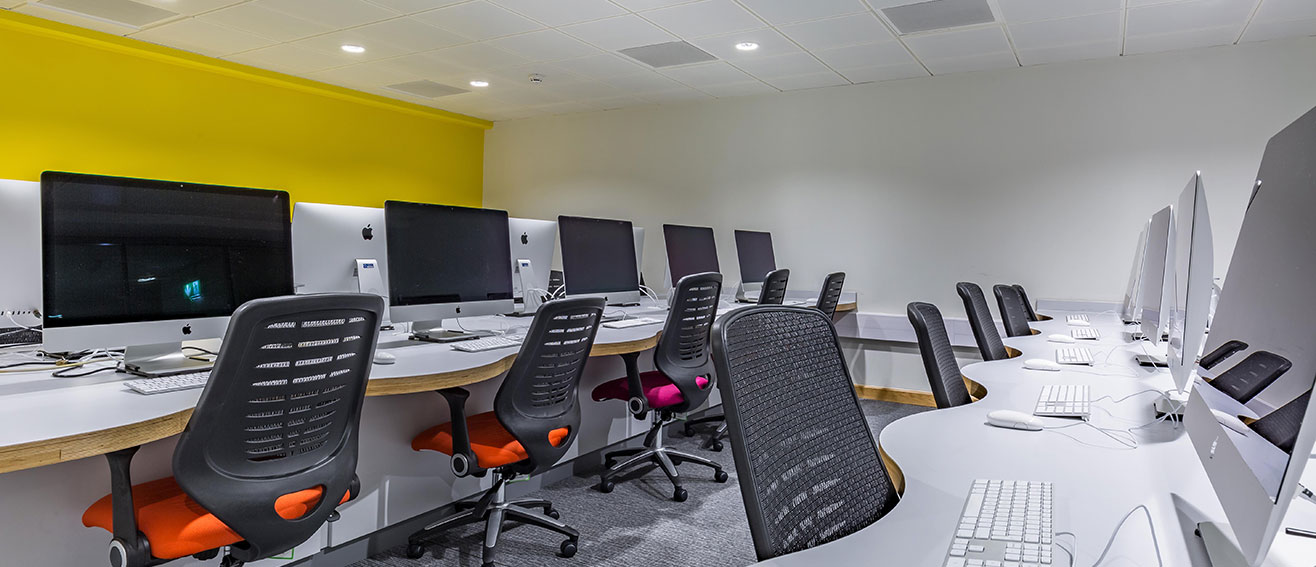
Mac Lab
The Mac Lab is fitted with Quad-Core and Dual GPU MacPros
-

Film Studio
The Film Studios are part of Elephant Studios at LSBU
-
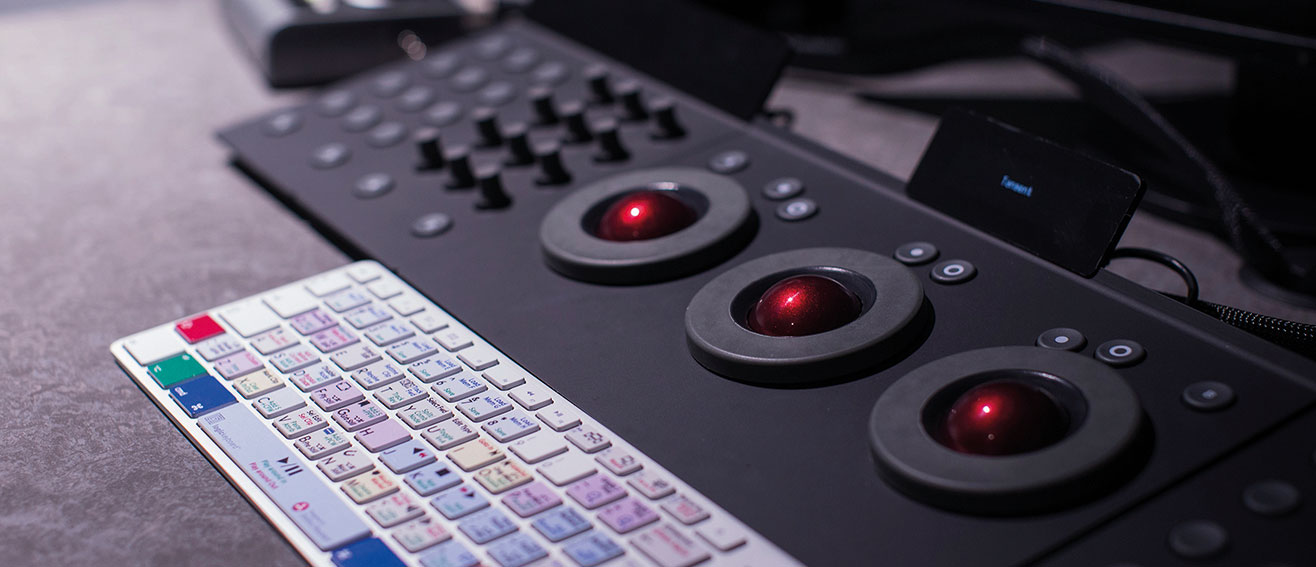
Editing Suites
Part of Elephant Studios, they are ideal for use in film and sound editing
-
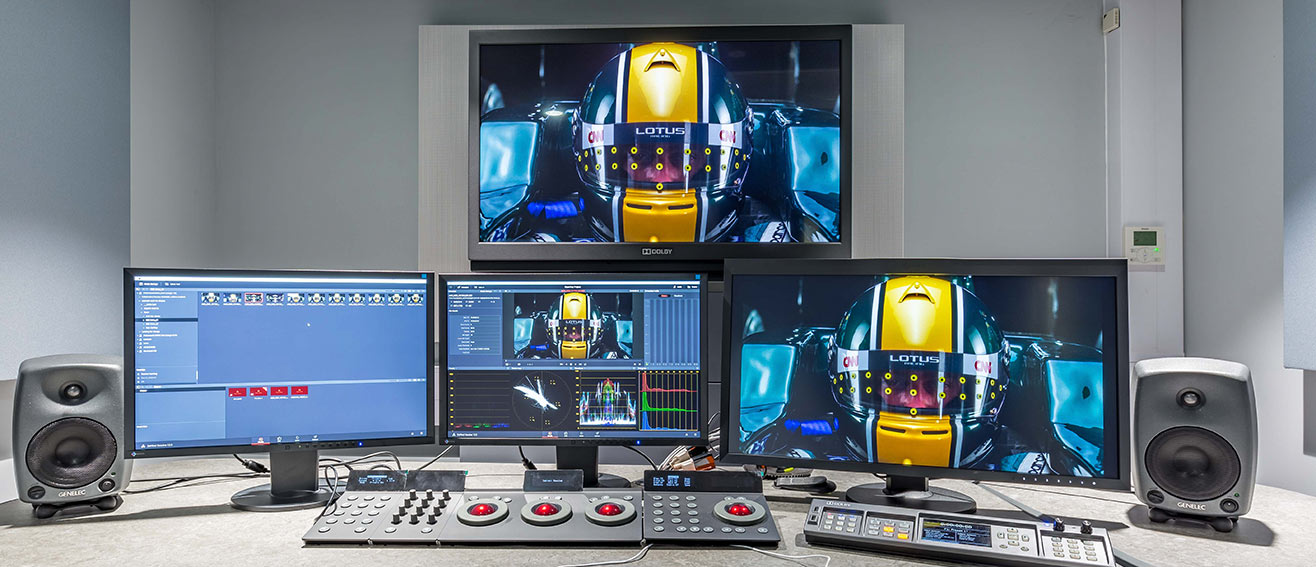
Grading Suites
The Grading Suites, part of Elephant Studios at LSBU, are designed for colourists
-

Sound Studio
The Sound Studio provides a versatile environment to work on musical projects
Careers
Employability Service
At LSBU, we want to set you up for a successful career. During your studies – and for two years after you graduate – you’ll have access to our Employability Service, which includes:
- An online board where you can see a wide range of placements: part-time, full-time or voluntary. You can also drop in to see our Job Shop advisers, who are always available to help you take the next step in your search.
- Our Careers Gym offering group workshops on CVs, interview techniques and finding work experience, as well as regular presentations from employers across a range of sectors.
Student Placements
- Parlophone Records
- Fifty Fifty post
- Vogue
- Big Talk
- Camberwell Studios
- Pinewood Prop Makers
- Chernobyl [TV]
- Blink
- Bohemian Rhapsody [film]
- Isle of Dogs [film]
- Working Title
- ITV Studios
- Arri rental
- Halo Post Production
Our Student Enterprise team can also help you start your own business and develop valuable entrepreneurial skills.
Studying film and television practice in London puts you at the centre of the film and TV making business. You’ll leave the course with a portfolio of work and a showreel you can be proud of, confident in your knowledge and ready to take your first steps in a professional career in the film, television and media industries. This course is also excellent if you want to make a career change, or focus, enhance or update your current film, TV and media skills.
You could also apply for further study at postgraduate level. Some of our postgraduates have presented at the British Film Institute and we’ve seen our students win prizes at major festivals.
Our teaching team have contacts with key production and post-production facilities and organise masterclasses with industry professionals.
Recent classes have featured: Mike Coles (Cinematographer), Victoria Thomas (Film Producer), Alasdair Baines (1st AC), Richard Turley (Writer/Director), Josh Buckingham (Commissioner at All4), Ola Aworetan (Gaffer), Mustapha Kseibati (Script Development Executive), Jude Winstanley (TV Line Producer), Rob Kraitt (Agent at Casarotto),Saima Ferdows (Assistant Producer),Helen Simmons (Feature Film Producer),
Nirpal Bhogal (Feature Film Director), Jasmin John (Assistant Editor), Hannah Williams (Casting Director), Rob Kraitt (Agent at Cassarotto), Mike Plante (Head of programming for short films at Sundance), Rich Warren (Festival Director – Encounters Short Film Festival), Mick Audsley (editor), Larry Sider (sound design), Bethan Jinkinson (Executive Editor, BBC), Lizzy Talbot (Intimacy Co-ordinator), Graham Sherrington (TV Director, Executive Producer), Rajesh Thind (Director, Writer, Producer). James Weddup (Head of BFI Network).
With our 'Final Film' module in 3rd year, and a specialism structure designed to develop specialist skills in Editing and Post-Production, Cinematography and Writing, Directing and Producing, LSBU's Film and TV Practice has employability at its heart, especially where such employability is understood as a commitment to new thinking and an enterprising spirit. That's why we're accredited by ScreenSkills.
National Association for Higher Education in the Moving Image (NAHEMI), the professional body that represents excellence in film education and all of major film schools and film courses in the UK and Ireland. http://nahemi.org/
BAFTA ALBERT - The British Academy of Film and Television Arts (BAFTA) albert education partnership brings the screen industries and university production courses together to provide students with an opportunity to learn about environmentally responsible working practices and their professional relevance, contributing to the transformation of the film and television industry. https://wearealbert.org/

- You will benefit from LSBU’s close partnership with The British Film Institute (BFI), the UK’s lead organisation for film, television and the moving image. This includes complimentary access to the BFI Player, the BFI’s award-winning streaming platform. The BFI Player is the leading platform for world and independent cinema, and has over 700 films as well as a wealth of POD rental titles and over 11,000 archival films that can be explored for free. Our partnership also means access to a range of bespoke masterclasses given by BFI staff members and BFI network colleagues. You will also have access to a number of benefits, discounts and offers. As the BFI is only a short walk away from LSBU, on London’s South Bank, you have ready access to the organisation that curates and presents the greatest international public programme of world cinema for audiences in cinemas, at festivals - and online.

- This course is accredited by ScreenSkills. ScreenSkills offers industry focused advice and quality control assurances for staff and students on filmmaking degrees; it offers 24 hour support for industry professionals, liaises with government, and it now delivers the BFI's Future Film Skills training.

- Blackmagic Design has grown rapidly to become one of the world’s leading innovators and manufacturers of creative video technology. Blackmagic Design’s founders have had a long history in post-production editing and engineering. With extensive experiences in high-end telecine, film and post, harnessed with a real passion for perfection, Blackmagic set out to change the industry forever. The partnership enables you to gain access to hands-on training using DaVinci Resolve and monthly masterclasses with industry professionals. DaVinci Resolve is the world’s only solution that combines editing, colour correction, visual effects, motion graphics and audio post production all in one software tool. Its elegant, modern interface is fast to learn and easy for new users, yet powerful for professionals.

- Our Film courses are approved by the National Association for Higher Education in the Moving Image (NAHEMI), the professional body that represents excellence in film education and all of the major film schools and film courses in the UK and Ireland. This provides you with exciting opportunities to collaborate, share best practice and increased learning possibilities with film schools and universities, nationally and internationally. It provides a high-profile showcase for your work and an opportunity to be at the forefront of debate in film pedagogies, extending our influence in film education and helping our students to succeed.
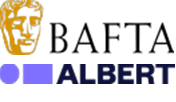
- The course is a BAFTA Albert educational partner. BAFTA albert is the UK-based authority on green film and television production and environmental sustainability and is leading the charge against climate change, bringing the screen industries together to tackle their environmental impact and inspire sustainable living. We are committed to arming our students with the practical information and tools they will need to create more sustainable content both on screen and behind the scenes and working with the screen industry for a greener future.

- Edinburgh Television Festival - Exclusive London University Partner with the UK’s most prestigious television industry event. It runs The Network Talent Scheme, an esteemed training programme that is committed to identifying and nurturing the next generation of talent from all backgrounds. The partnership enables you to gain access to bespoke mentorships, sessions, masterclasses, job opportunities and career support to help kick start your career.
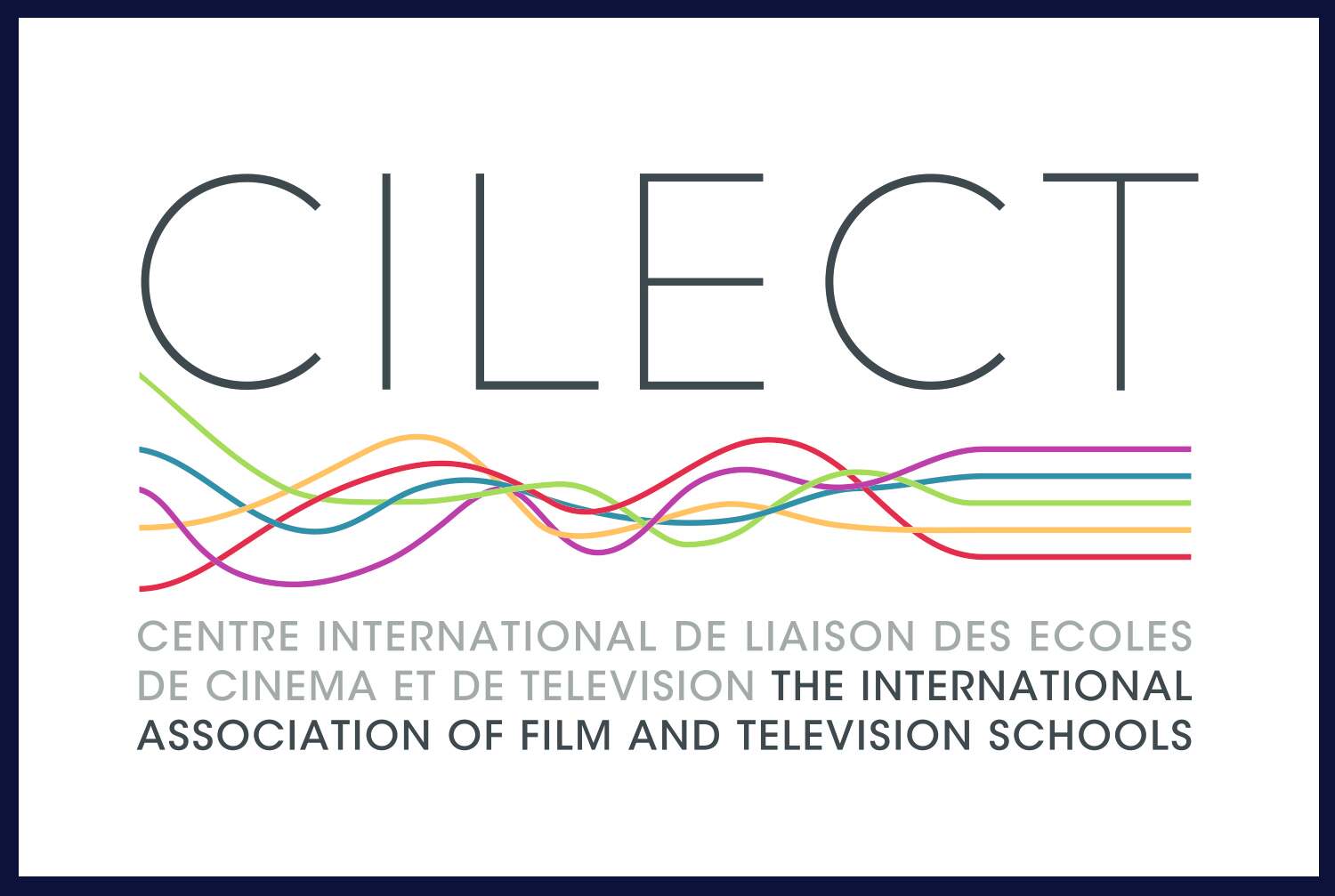
- This course is recognised as world leading for film and television education. It is accredited by the prestigious cilect International Association of Film and Television Schools (Centre International de Liaison des Ecoles de Cinéma et de Télévision—CILECT), a global organisation of top-tier film schools dedicated to developing and maintaining the highest possible standards in screen education. Membership of CILECT offers LSBU staff and students’ opportunities to collaborate and exchange ideas and means our student films are eligible for the Student Academy Awards (the Oscars)
Teaching and Assessment
Your practical work will be supported by a team of Technical Tutors and will utilise our resources in Elephant Studios. Here, you will have access to 4K Digital Cinema Cameras, 4K Cinema and Film Studio, along with a range of HD cameras, photographic studios, field sound recording equipment and computer labs with high-spec computers supporting cutting-edge video and multimedia software.
| Time spent in lectures and seminars | Self-directed learning | Placement | |
|---|---|---|---|
| Year 1 | 25% | 75% | 0% |
| Year 2 | 27% | 70% | 3% |
| Year 3 | 15% | 85% | 0% |
Personal Tutoring
As an undergraduate Arts and Creative Industries student, you will be allocated a named tutor during your first three weeks at LSBU. The role of your tutor is to be your primary contact for academic and professional development support.
Your tutor will help you get the most out of your time at LSBU, providing advice and signposting to other sources of support in the University.
Your tutor should be the first person at the university that you speak to if you are having any difficulties that are affecting your work. These could be academic, financial, health-related or another type of problem.
You will have appointments with your personal tutor at least once a semester for 20-30 minutes throughout your course. You can contact your tutor for additional meetings or support by email.



